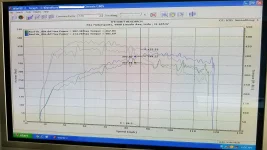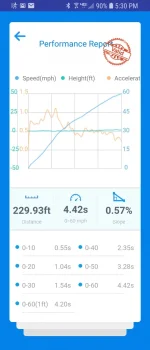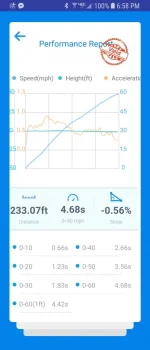Oh my goodness. This becoming too much.

First, I want to only read valid observations from another Genesis owner who also tested a 5.0 engine stock and with the K&N air filters with any type of GPS measuring data to back-up the claimed results. I do not want to keep reading any negative feedback based on different model Genesis like the 3.3T tuned or stock, different engines and drive-train so not really comparable. Weight does mean anything since the Genesis G70 is lighter than the
Stinger, but the
Stinger is about 3/10th faster in magazine test even if both has the same 3.3T engine.
I actually performed my acceleration run going up hill at the end while turning left and right around corners, so the road was not in the Genesis favor.
Car and Driver used 91 octane for the 2015 Genesis test which makes 420hp per Hyundai, however I use 93 octane so my engine probably making more than 420hp in stock form due to the higher octane so my stock 0-60 times may be quicker than what Car and Driver made as well. However, this all speculation on my part since I did not dyno the engine nor do a measured 0-60mph run with the stock filters.
All I know is that I swapped the sad looking stock air filters for K&N performance air filters and noticed an increase in performance right away. I measure the car's performance and the GPS test data also reinforced what I felt from the driver's seat. I got 4.7 in ECO mode on a curvy road going slightly uphill. Therefore, I believe that the 2015 Genesis is much quicker than 4.7 seconds with a good launch in sport mode with performance filters. Have not had time to test my theory due to traffic and rain.
It would be nice for an actual owner to provide a measured base line for a stock 2015 Genesis 5.0 model so we can actually get an good understanding of what the car can really do in stock form besides the one pre-production test car Car and Driver used in 2014. For all we know, a stock 2015 Genesis can do 4.7 seconds in stock form with 93 octane fuel. The car is actually not really tested outside the pre-production models nor with 93 octane fuel.
Most of these negative member commits are just based on limited information. I would understand major resistant to me posting times that goes against other measure times provided in the forum, but no one else really tested the 2015 5.0 Genesis aside from myself. All the negative statements are just opinions and speculation based on subjective thinking.
I ran a 4.7 0-60 time in ECO mode, so the V8 engine is quick with K&N performance filters and is probably much faster in Sport mode, so get over it.

I understand that someone spend $$$$ to make a 3.3T faster than V8 and wants to feel that the gains are much more but is probably not it seems.
So unless, someone can post some actual 0-60 times for the 2015-newer 5.0 V8 engine than keep your negative commits to yourself please if you already posted them once, unless you have proof to go along with them of what a 5.0 engine can do besides magazine articles of the pre-production model.













